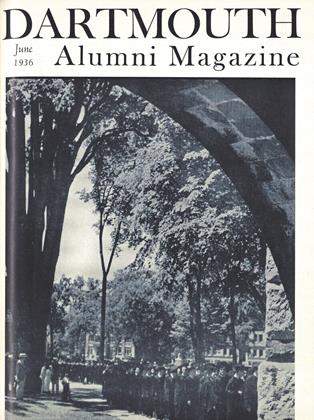WITH THE ELECTION by The Dartmouth Union Cabinet last month of Roger W. Barney '37 as president and Edwin Doremus '37 as secretary, the Union neared the completion of its third year of successful operation since the reorganization of the old Dartmouth Christian Association into the present body. Organized in June, with the view of freshening the then existing attitude toward religion in the College through the laying of emphasis "upon intellectual inquiry and upon the stimulation of serious thought," the Union, under the direction mainly of its student Cabinet, has effected its program in a four-fold manner: presentation to College audience of a panel of nine speakers, organization of student-faculty discussion groups, maintenance of a Rural Preachers' Bureau for supplying neighboring pulpits, and the fulfilment of various social service functions.
Prominent among the outside speakers presented were Bill Simpson, idealist and social service worker, who spent three days in Hanover addressing meetings and holding individual conferences with students; Dr. T. Z. Koo, student of religious, political, and industrial problems in China; Sherwood Eddy, former International Secretary of the Y. M. C. A. and renowned author; and Toyohiko Kagawa, Japanese evangelist and humanitarian. As a subpanel, the Union also included representatives of several religious faiths who explained their major tenets. Funds for the lecture part of the program, the only phase demanding any appreciable expenditures, were derived from part of the balance remaining from the old D. C. A. fund and mainly from appropriations allowed by the President's Lecture Fund.
Over a hundred and twenty-five students, meeting in groups of from eight to twelve, have participated in student-faculty discussions during the year. These groups, each under the leadership of a member of the faculty and organized by a student selected by the Union, were composed of undergraduates who were interested either in discussing a specific topic or in meeting a faculty member on more intimate terms than ordinary classroom contact permits, and met three or four evenings each, during as many weeks, usually in the homes of the instructors. Favored among the topics of discussion were: moral problems of the college man, contemporary threats to peace, a college man's religion, the problem of labor in America, values in undergraduate life, and athletics in college. The personnel of the groups was determined from the returns to a questionnaire distributed to the students, asking for an expression of interest under the two categories mentioned. For those instructors who were unable to invite groups to their homes, the Union opened its room in Robinson Hall where conditions approaching a home fireside were available.
Resulting from a request on the part of a neighboring community church for student preachers while they were engaged in obtaining a new minister, the Rural Preachers' Bureau was organized last fall. The pulpit of another church, temporarily vacated through the illness of its pastor, afforded increased activity for the Bureau until now, with a single exception, between Christmas and spring vacation the group was active in one church every Sunday.
The remainder of the Union's program has included various activities. In the early fall, the Union cooperated with The Green Key in arranging orientation feeds for the freshmen, the Key gathering the freshmen in each dormitory and the Union providing a speaker. During the course of the year, an appeal from the C. C. C. camp at Plymouth, Vermont, resulted in two carfuls of students journeying thither with musical, comical, and even intellectual entertainment.
Tentative plans for next year's program include distribution of a new questionnaire in the College and expansion of the student-faculty discussion groups, inauguration of a bi-weekly or tri-weekly series of Sunday afternoon musical vespers in the Chapel, and increased participation in student —EDWIN DOREMUS '37.
 View Full Issue
View Full Issue
More From This Issue
-
 Article
ArticleSOCIAL SURVEY REPORT
June 1936 By The Editors -
 Class Notes
Class NotesClass of 1935
June 1936 By William W. Fitzhugh Jr. -
 Class Notes
Class NotesClass of 1929
June 1936 By F. William Andres -
 Class Notes
Class NotesClass of 1911
June 1936 By Prof. Nathaniel G. Burleigh -
 Article
ArticleTHE SONS AND DAUGHTERS OF '79
June 1936 By Clifford Hayes Smith -
 Class Notes
Class NotesClass of 1934
June 1936 By Martin J. Dwyer Jr.







